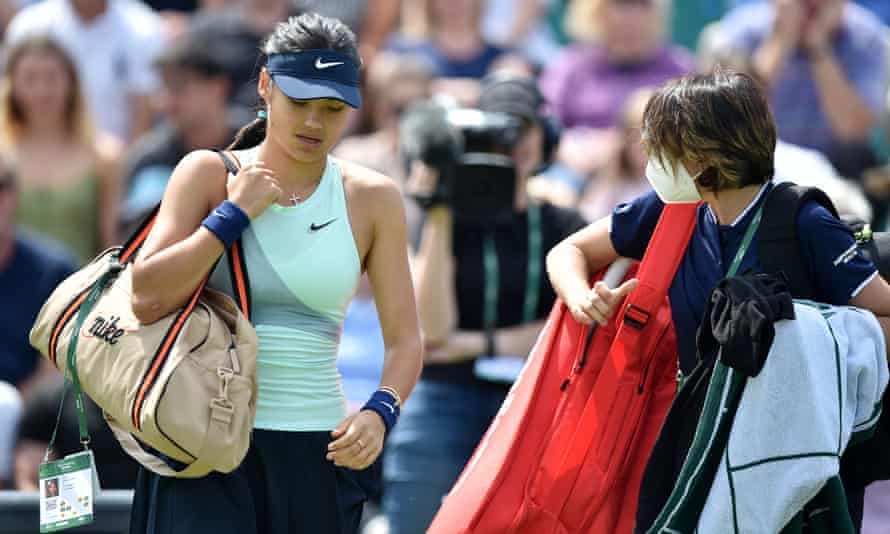Even in defeat Emma Raducanu digested her second-round loss at the French Open last month with striking positivity. Five months into a season of constant stopping and starting with various injuries, along with doubts she would even make it to Paris, a part of Raducanu seemed relieved to have finished a tournament in one piece: “It is definitely positive that I’m coming out of this match feeling pretty good physically,” she said.
It did not last long. Just over a week later, in her first match back on home soil on Tuesday, Raducanu was out of the Rothesay Open Nottingham with a side injury that forced her to withdraw during her first-round match against Viktorija Golubic.
The news is not as devastating as it could have been. Raducanu has predictably withdrawn from the Rothesay Classic in Birmingham next week but it seems she will be healthy enough to resume her grass season in Eastbourne the following week and then Wimbledon. It is, however, yet another niggling injury that takes her from the court and away from her goal of improving, and her list of ailments over the past nine months makes for grim reading. It is a fairly normal occurrence for young athletes to struggle physically as their bodies adapt to the demands of professional sport and this is particularly true in tennis, with the added travel and adaptation to different surfaces, conditions, balls and opponents each week.
This seems a problem Raducanu was always going to have to reckon with since her injury proneness precedes her professional career. Her junior career was continually disrupted. “I had never played that many tournaments throughout the years because of various reasons, injuries, school, niggles,” she said at Wimbledon last year.
Of the 19 lower-level pro tournaments she played before 2021, Raducanu retired from four of them. These obstacles are heightened by her lack of experience at any level – of those 19 events, only three times did she ever play any back-to-back.
Over the past few months Raducanu has been clear about her inexperience and how she is learning on the job. But it makes her change of heart with the split from Torben Beltz notable. During her search for a new coach at the end of last year, her intention was to equip herself with someone experienced who could guide her through the next steps of her career. That is lacking in her daily team as she continues to plough on primarily with a series of supporting voices not on her payroll, notably Iain Bates, the LTA’s head of women’s tennis, and the technical adviser Louis Cayer, the LTA’s senior performance adviser and doubles coach.

Raducanu works with the physios Tom Cornish and Will Herbert, the latter an LTA physio, who accompanies her at different events. The challenge for her is finding what works and sticking to it. In recent weeks those experiments led her to spending more time in the gym during tournaments. Should this run of injury niggles continue, it may be prudent to consider looking for a permanent physio and trainer to accompany her throughout the year.
Such problems are not exclusive to Raducanu. Bianca Andreescu, also a teenage US Open champion, managed to squeeze a US Open title and two WTA 1000 wins between two long-term injuries and she is only now enjoying a run of good physical and mental health on the tour. Leylah Fernandez seemed to be separating herself from Raducanu last week, reaching the quarter-final of the French Open and threatening an even deeper run.
Fernandez, whom Raducanu beat in the US Open final, was clearly injured in her three-set quarter-final defeat by Martina Trevisan, during which her father frequently gestured for her to retire. She did not but on Wednesday she announced that the foot injury she was playing with was a fracture, which means she is now on crutches and faces a layoff. She, too, will learn how to manage her body properly with more experience.
“I don’t really know her that well but people don’t give enough credit to her. She has been playing good,” said Maria Sakkari, the world No 5, on Raducanu in Birmingham this week.
“It is not easy, if you exclude the US Open. She is 19. The level at WTA is very, very high, so it is going to take time for her and every young player just to get used to the level.”
It is unsurprising Sakkari would suggest patience with Raducanu. At Raducanu’s age Sakkari was barely ranked inside the top 300 and after reaching the top 100 aged 21 in 2016, it took her another five years to reach the top 10. With her own patience, work ethic and the plenty of mistakes she has learned from, Sakkari has built herself into one of the most impressive athletes on either tour.
For anyone who wants to build a substantial career this is a long-term pursuit. Players deserve the space to learn from their decisions and particularly from those that do not work out. Raducanu should reach a point where she is on court as much as possible, testing her strength, learning the ropes of professional tennis and developing as a player, not arriving at each new tournament with the simple hope of remaining in one piece for its duration.
